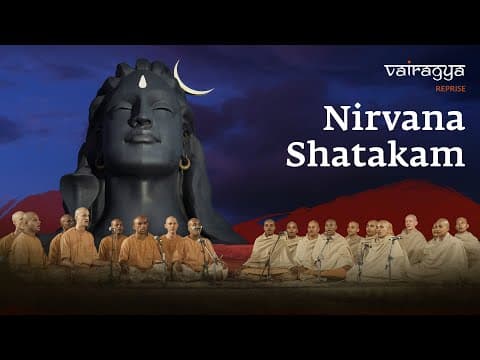Nirvana Shatakam | निर्वाण षट्कम्
Nirvana Shatakam Sanskrit Lyrics
Verse 1: मनोबुद्ध्यहङ्कार चित्तानि नाहं न च श्रोत्रजिह्वे न च घ्राणनेत्रे । न च व्योम भूमिर्न तेजो न वायुः चिदानन्दरूपः शिवोऽहम् शिवोऽहम् ॥१॥ Verse 2: न च प्राणसंज्ञो न वै पञ्चवायुः न वा सप्तधातुर्न वा पञ्चकोशः । न वाक्पाणिपादौ न चोपस्थपायू चिदानन्दरूपः शिवोऽहम् शिवोऽहम् ॥२॥ Verse 3: न मे द्वेषरागौ न मे लोभमोहौ मदो नैव मे नैव मात्सर्यभावः । न धर्मो न चार्थो न कामो न मोक्षः चिदानन्दरूपः शिवोऽहम् शिवोऽहम् ॥३॥ Verse 4: न पुण्यं न पापं न सौख्यं न दुःखं न मन्त्रो न तीर्थं न वेदा न यज्ञाः । अहं भोजनं नैव भोज्यं न भोक्ता चिदानन्दरूपः शिवोऽहम् शिवोऽहम् ॥४॥ Verse 5: न मृत्युर्न शङ्का न मे जातिभेदः पिता नैव मे नैव माता न जन्म । न बन्धुर्न मित्रं गुरुर्नैव शिष्यं चिदानन्दरूपः शिवोऽहम् शिवोऽहम् ॥५॥ Verse 6: अहं निर्विकल्पो निराकाररूपो विभुत्वाच्च सर्वत्र सर्वेन्द्रियाणाम् । न चासङ्गतं नैव मुक्तिर्न मेयः चिदानन्दरूपः शिवोऽहम् शिवोऽहम् ॥६॥
Nirvana Shatakam English Lyrics
Verse 1: Mano-buddhy-ahaṃkāra-cittāni nāhaṃ Na ca śrotra-jihve na ca ghrāṇa-netre Na ca vyoma bhūmir na tejo na vāyuḥ Cid-ānanda-rūpaḥ śivo'ham śivo'ham ||1|| Verse 2: Na ca prāṇa-saṃjño na vai pañca-vāyuḥ Na vā sapta-dhātur na vā pañca-kośaḥ Na vāk-pāṇi-pādau na copastha-pāyū Cid-ānanda-rūpaḥ śivo'ham śivo'ham ||2|| Verse 3: Na me dveṣa-rāgau na me lobha-mohau Mado naiva me naiva mātsarya-bhāvaḥ Na dharmo na cārtho na kāmo na mokṣaḥ Cid-ānanda-rūpaḥ śivo'ham śivo'ham ||3|| Verse 4: Na puṇyaṃ na pāpaṃ na saukhyaṃ na duḥkhaṃ Na mantro na tīrthaṃ na vedā na yajñāḥ Ahaṃ bhojanaṃ naiva bhojyaṃ na bhoktā Cid-ānanda-rūpaḥ śivo'ham śivo'ham ||4|| Verse 5: Na mṛtyur na śaṅkā na me jāti-bhedaḥ Pitā naiva me naiva mātā na janma Na bandhur na mitraṃ gurur naiva śiṣyaṃ Cid-ānanda-rūpaḥ śivo'ham śivo'ham ||5|| Verse 6: Ahaṃ nirvikalpo nirākāra-rūpo Vibhutvācca sarvatra sarvendriyāṇām Na cāsaṅgataṃ naiva muktir na meyaḥ Cid-ānanda-rūpaḥ śivo'ham śivo'ham ||6||
Nirvana Shatakam English Meaning
Verse 1: I am not the mind, nor the intellect, nor the ego, nor the memory, Nor am I the ears, the tongue, the nose, or the eyes. I am not space, nor earth, nor fire, nor air. I am the form of consciousness and bliss; I am Shiva, I am Shiva. Verse 2: I am not the vital life force, nor the five types of breath, Nor the seven material elements, nor the five sheaths of the body. I am not the organ of speech, nor hands, nor feet, nor the organs of procreation or elimination. I am the form of consciousness and bliss; I am Shiva, I am Shiva. Verse 3: I have no aversion or attachment, no greed or delusion, No pride or the feeling of envy. I am not bound by duty, wealth, desire, or liberation. I am the form of consciousness and bliss; I am Shiva, I am Shiva. Verse 4: I am not virtue or vice, not pleasure or pain, Not mantra, nor pilgrimage, nor scriptures, nor rituals. I am not the act of eating, the food, or the eater. I am the form of consciousness and bliss; I am Shiva, I am Shiva. Verse 5: I have no death or fear, no distinction of caste, No father, no mother, nor do I have birth. I am not a relative, nor a friend, nor a teacher, nor a student. I am the form of consciousness and bliss; I am Shiva, I am Shiva. Verse 6: I am without any variations, and I am without any form, I am all-pervading, present everywhere, and the master of all senses. I am not unattached, nor am I liberated, nor am I measurable. I am the form of consciousness and bliss; I am Shiva, I am Shiva.

Nirvana Shatakam Significance
The Nirvana Shatakam, also known as Atma Shatakam, is a profound stotram by Adi Shankaracharya that encapsulates the core teachings of Advaita Vedanta. Its significance lies in its powerful declaration of the true nature of the Self (Atman) as being identical to the ultimate reality (Brahman). Through a process of negation ("neti neti"), the stotram systematically dismantles the illusion of the individual's identification with the body, mind, senses, and even social constructs, ultimately revealing the Self as pure consciousness, bliss, and eternal existence (Sat-Chit-Ananda). By meditating on these verses, one is guided to transcend limitations, realize their inherent freedom, and attain liberation (moksha) from the cycle of birth and death, which is the ultimate goal of human life according to Advaita Vedanta.
